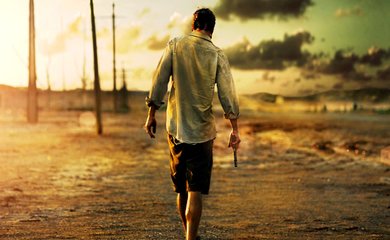Director David Michôd’s dystopian Western “The Rover” is a Spartan, intimate affair played out over vast distances in the Australian outback. Set ten years after a global economic collapse the world’s great unwashed have scurried Down Under like rats from a prison ship to work in the mines. This new gold rush like so many others in history only seems to help hasten mankind’s moral decline into murderous barbarism.
The film opens with a grizzled close-up of a loner called Eric deep in thought and besieged by flies. We try to read the lines in his face, the diluted blue of his eyes and the lank hair slowly disappearing from his head. What foulness is he trying to remember, what hideous experience is he trying to forget? Eric exits his car and drifts into a roadside shack to drench his self loathing in soul rotting booze distilled from god only knows what.
Eric’s brief sojourn is shattered when a gang of bickering desperadoes crash their getaway car and steal his vehicle. Archie, Caleb and Henry are two bit losers fleeing a robbery homicide. They’re just the violent, incompetent, bunglers commonly found in Sam Peckinpah or Clint Eastwood movies. To Eric, the loss of his car is like losing a limb or having his child kidnapped, his entire body seethes with quiet, apocalyptic rage leaving us in doubt that he will hunt the gang down and execute them.
Henry’s dim-witted brother Rey typifies this uneasy pity we feel for many of the characters. Left for dead at the scene of the crime, Rey like everything else in “The Rover” is covered in a film of dust, scum and greasy perspiration. Later a chance encounter with Eric near a fleapit opium den has Rey press-ganged into tracking down his brother. It’s a classic Western set-up seen in movies like, “The Good, the Bad and the Ugly” or “Red Sun,” the uneasy truce between enemies to achieve a common goal, but in Michôd’s film this relationship has the weight of a biblical tale from The Old Testament.
Rey tries to explain his belief in God but Eric demolishes his blind faith, “I’ll tell you what God’s given you. He’s put a bullet in you and he’s abandoned you out here to me. He feels nothing for you. He couldn’t give a fuck if you died tomorrow. God gave you a brother who’s not waiting for you. He gave you a brother who’s not even thinking about you right now. Just cause you and him came out of the same woman’s hole… The only thing that means anything right now is that I’m here and he’s not. Your brother left you to die. That’s what people do. You don’t learn to fight, your death’s going to come real soon.”
Much of Eric and Rey’s antipodean odyssey is silent and brooding, an existential road movie that navigates “The Collapse” in strikingly powerful images underpinned by Antony Partos’ malignant, bruising score. A freight train stretches as far as the eye can see defended by ex-SAS types, armored shop fronts dispense fuel and ammunition through grills and soldiers still try to enforce the law prowling in Hummers. Life is cheap and Rey is consumed by the guilt of his violence in a world that is slowly ridding itself of that emotion. The murderous Eric answer to him reveals a shred of his old humanity in this new moral landscape, “You should never stop thinking about a life you’ve taken. That’s the price you pay for taking it.”
When Guy Pearce as Eric speaks you take notice, the world seems to slow down. His intensity is barely contained inside his sinewy body and he dominates the widescreen vistas. When Eric’s brutal rampage is finally complete Pearce totally sells the uneasy quandary behind Eric’s reason for never relenting, never quitting on his car. Robert Pattinson’s Rey is like a weasel wrapping his body around the bottom of the frame ready to pounce on any opportunity. His Southern American dope would be equally at home in a Steinbeck novel, his inarticulate musings not without some merit, “not everything has to be about something.”
And yet “The Rover” is certainly about something. Released amid war in Ukraine, Gaza, the scourge of Isis, the largest outbreak of Ebola ever seen and the tragic events in Ferguson we feel like we are watching the precursor to “The Collapse” unfold in front of our very eyes. No “The Rover” isn’t just another revenge flick; it’s more like a chilling foray into the darkness of Cormac McCarthy and beyond. Let Eric ask you this, “What feeling do you have when you wake up in the morning? When your feet touch the floor or before that when you’re laying there, thinking about your feet hitting the floor, what feeling do you have? What does that feel like for you?”

